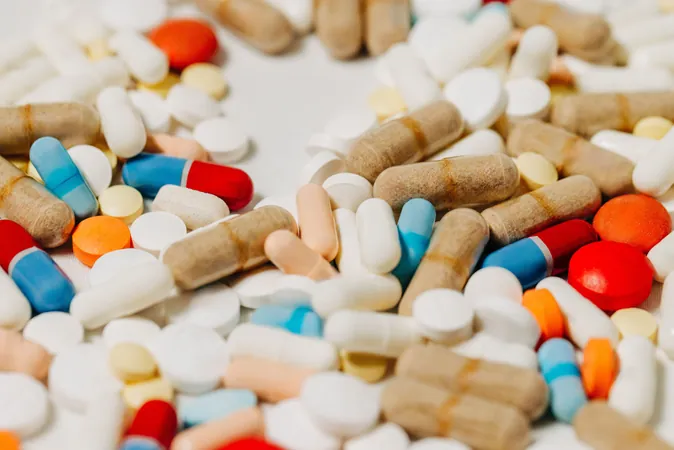
Pharmacists Take the Lead in Promoting Self-Care and Making Healthcare Accessible
2025-04-04
Author: Mei
Introduction
In today's healthcare landscape, the concept of self-care is emerging as a vital component for reducing medical expenses and enhancing accessibility for patients. As the demand for effective treatment options grows, investing in self-care programs has never been more crucial. Self-care often encompasses over-the-counter (OTC) medications and other interventions, but it also highlights the indispensable role pharmacists play in disease prevention, maintenance of health conditions, and addressing various health challenges. This is particularly important for underserved communities grappling with health disparities.
Social and Economic Factors Impacting Self-Care
A recent study published in Current Medical Research and Opinions revealed significant social and economic factors that affect individuals' ability to engage in self-care. Common ailments often treated through self-medication included headaches, gastric pain, respiratory issues, and allergies. The findings indicated that education level, income, employment status, and healthcare access were closely linked with the likelihood of self-care behaviors.
Health Disparities and Pharmacist's Role
“The location where you live, your income, and your available opportunities often dictate health disparities,” remarked Mike Reid, an associate professor at the Institute for Global Health Sciences at UCSF. He emphasized the need for integrating self-care strategies into wider health system improvements, stating, “When individuals are empowered with the knowledge and tools to manage their health, we not only improve personal well-being but also uplift entire communities.”
Statistics on Health Complications
The statistics surrounding health complications are alarming. For instance, around 34% of people suffer from allergic diseases, with those living in deteriorating housing conditions and polluted environments being disproportionately affected. Furthermore, children whose parents suffer from substance use disorders are at higher risk for malnutrition, illustrating the cascading effects of health challenges within families.
Pharmacists as Guides in Self-Care
Pharmacists are crucial in guiding patients on appropriate OTC use, utilizing their expertise to assess individual health needs, recommend suitable self-care measures, and create tailored patient plans. For those with limited health literacy, pharmacists serve as essential educators, warning against potential negative outcomes of improper OTC usage. Their clinical services have shown promise in enhancing healthcare access for individuals in underserved regions.
Success Stories of Pharmacists' Interventions
An illuminating study published in the Journal of the American Pharmacists Association highlighted a pharmacy in Virginia, where pharmacist interventions concerning self-care and OTC products significantly lowered medication costs and boosted patient satisfaction. Another review in Exploratory Research in Clinical and Social Pharmacy showed that pharmacist interventions led to a 58% improvement in safe dosing for pediatric patients.
Pharmacists' Expanding Role
Beyond merely overseeing self-care, pharmacists are positioned to contribute knowledge across various health domains, including nutrition, exercise, and overall wellness.
Collaboration in Health Equity
“The right to health is fundamental and requires collaboration among all healthcare stakeholders,” said Emese Csoke, global medical access lead at Bayer's consumer health division. She stressed the necessity of addressing health inequalities to achieve equitable health outcomes, advocating for collective efforts in promoting self-care as a path to health equity.
Conclusion
As healthcare continues to evolve, the role of pharmacists in facilitating self-care and addressing health disparities is more critical than ever. With their expertise, they not only empower individuals but also foster healthier communities, paving the way for a more inclusive healthcare system for all.




 Brasil (PT)
Brasil (PT)
 Canada (EN)
Canada (EN)
 Chile (ES)
Chile (ES)
 Česko (CS)
Česko (CS)
 대한민국 (KO)
대한민국 (KO)
 España (ES)
España (ES)
 France (FR)
France (FR)
 Hong Kong (EN)
Hong Kong (EN)
 Italia (IT)
Italia (IT)
 日本 (JA)
日本 (JA)
 Magyarország (HU)
Magyarország (HU)
 Norge (NO)
Norge (NO)
 Polska (PL)
Polska (PL)
 Schweiz (DE)
Schweiz (DE)
 Singapore (EN)
Singapore (EN)
 Sverige (SV)
Sverige (SV)
 Suomi (FI)
Suomi (FI)
 Türkiye (TR)
Türkiye (TR)
 الإمارات العربية المتحدة (AR)
الإمارات العربية المتحدة (AR)